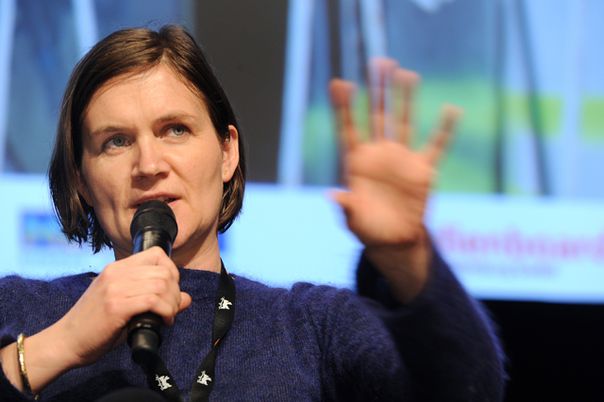The Art of Observation
An interview with documentary filmmaker Sophie Fiennes, who joined the Campus for the event "The Other Side of Reality".

Sophie Fiennes
After going to art school and working with filmmaker Peter Greenaway and choreographer Michael Clark, documentary filmmaker Sophie Fiennes started on the path of filmmaking. In her films, she unveiled the worlds of Alain Platel, Lars von Trier, Slavoj Zizek and Alfred Kiefer, among others. After the Berlinale Talent Campus session “The Other Side of Reality”, Katja Cicigoj got a peek into her own film-world.
Why did you decide to make documentaries instead of fiction films?
The reality behind things happening is so much greater than anything I could come up with in my imagination – I am humbled by the richness there is in the world. If you have a script, everything is prescribed, whereas in observational documentary there’s the risk that there is no story, but then you discover there are so many things going on behind… Documentary filmmaking is an ecstatic way of going out into the world.
Your documentaries are very different from the prevalent way documentaries are made today – informational, educational, sensational… Why do you choose to make observational documentaries instead?
I am excited by visual language. Words denote exactly what you want to communicate, while with pictures, meaning is more open. In real life we don’t talk in voice-over, there is a lot of music or silence; there are a lot of things going on which aren’t just speech. The idea that everything should be colonized by language reduces the real in the world. I prefer moulding things into an open system in the way that visual language allows you to.
You said that your films do have stories, but do not have a plot. Can you explain this?
A plot is a premeditated series of events, whereas a story is more organic, the possibilities for it are more open, we are not controlling it so much. It is about allowing the world to reveal itself to you. Storytelling is revelation without wanting it to be encapsulated by meaning. It’s more how life is – it is messier.
I like playing with the word “responsibility,” the ability to respond, to be finely tuned, to listen to the most subtle voices. Observational filming is like that – something happens between you and your subject. But if you come with a will to prove someone wrong, you can’t be so sure of your position to attack. I am doubting all the time – that’s why I don’t want to put a voice-over in my films. In a few years the message you conveyed might not hold anymore. But if you keep an open system, it is open also to how the world changes.


301 Moved Permanently